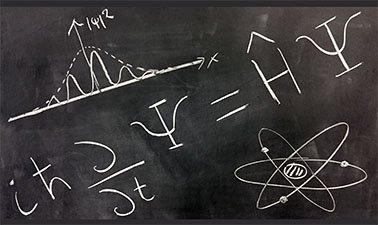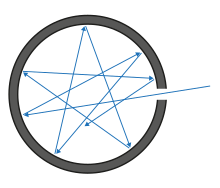Quantum mechanics for beginners (1)
Introduction
Quantum mechanics is an important field in physical chemistry that deals with the structure, interaction and dynamics of atoms, molecules and elementary particles. In the series "quantum mechanics for beginners" I try to cover the basics and explain them easily understandable.
So first, we take a closer look at the phenomena that can be described with quantum mechanics. They can basically be divided into:
- Macroscopic phenomena
- Microscopic phenomena
Macroscopic phenomena include blackbody radiation and the specific heat of solids. The photo effect, Compton effect, the stability of atoms and the electron diffraction are counted among the microscopic phenomena.

Black Body Radiation
First, we need to describe the radiation properties of the materials glass, metal and soot:
Glas
Glass is an insulator in which the electrons are firmly bound to the ionic rumps. These are several thousand times heavier than electrons, which allows only a slow oscillation - therefore, it only comes to coupling to low-frequency infrared radiation.Metal
The charge carriers (electrons) are virtually free to move and are stimulated to vibrate by electromagnetic radiation. The oscillating charge carriers emit electromagnetic waves at the same frequency, which leads to a high reflectivity.Soot
Soot consists of cyclic hydrocarbons whose electrons are delocalized through the molecule structure. However, the mean free path is limited to the molecular size. The energy absorbed by the electromagnetic radiation can be efficiently transferred to the molecule structure.
At very high temperatures, good coupling between electrons and ion lattice occurs in all molecules. In metals, the ion movement leads to a strong reduction of the electron mobility and thus also to a strong coupling to the ionic hulls. To study the relationship between electromagnetic radiation and the temperature of a solid, it is therefore beneficial to use a strong absorber. The whole thing is realized by a black body, because here the coupling between electromagnetic field and the temperature is particularly good.
Measurement realization:
The cavity is coated with a layer of soot and has only a small opening. As a result, it absorbs the radiation almost perfectly due to the repeated reflection and absorption and only a very small part can escape again.

The radiation inside the cavity radiator is in thermal equilibrium with its temperature.
The next article is devoted to the question of how big the energy density at a given frequency and temperature is and it shows you an approach to the calculation. If the article has caught your interest or you have a question, leave a comment!
Congratulations @mgrgic! You received a personal award!
Click here to view your Board
Congratulations @mgrgic! You received a personal award!
You can view your badges on your Steem Board and compare to others on the Steem Ranking
Vote for @Steemitboard as a witness to get one more award and increased upvotes!